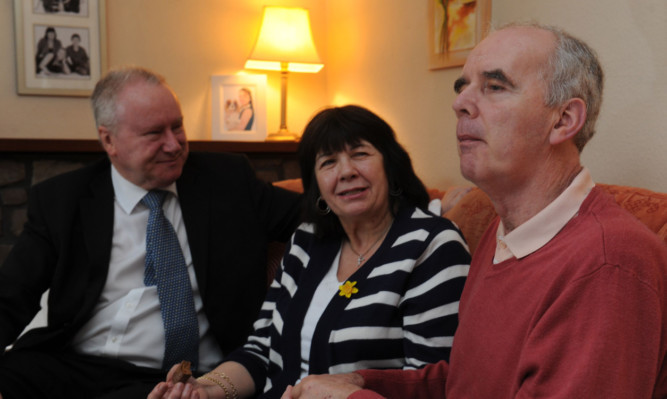Ministers and councils are “playing God” with people who have terminal illnesses, according to the woman campaigning to extend free personal care to under 65s.
Amanda Kopel wants to see Frank’s Law, named in honour of her husband, Dundee United legend Frank Kopel, rolled out across Scotland.
The Kirriemuir man died last April having been diagnosed with vascular dementia and alzheimer’s six years ago aged just 59.
Amanda is carrying a petition through the Scottish Parliament but has been frustrated at the speed of progress.
The most recent response from the Scottish Government came from former Health Secretary Alex Neil, who said “clear guidance” is in place to ensure no one in the last six months of a terminal illness should be charged for the care they receive at home.
However, Amanda accused those making the decisions, both at government and local authority level of “playing God by predicting when people will pass away”.
She said: “How are they able to predict people dying, when even experts get it wrong?
“Myself and my family certainly did not know in November 2013 that Frankie would lose his six-year battle with dementia in April 2014.
“No doctor or consultant or any dementia expert could tell us that on Frankie’s birthday, March 28, that Frankie would lose his battle 19 days later.
“It came as a shock to us all.”
Health Secretary and Dundee City East MSP Shona Robison, who will meet Mrs Kopel at the end of the month to discuss her campaign, said she was keen to look at the issue of extending free personal care “in more detail”.
On six months end of life care, she added: “We’ve used the same definition as is used by the Department for Work and Pensions for continuity and consistency because it’s a very difficult thing to judge.
“Quite often it will be a clinical judgment which will be on the best available evidence at that moment in time.
“These things are never entirely clear cut but we felt that following the guidance and practice other agencies have used would be the best way of doing that.”
First Minister Nicola Sturgeon confirmed the issue would be monitored closely.
She told The Courier: “I think these things always have to be kept under review but the accepted definition of end-of-life care is in context and that’s the one we have adopted in terms of the guidance.”
